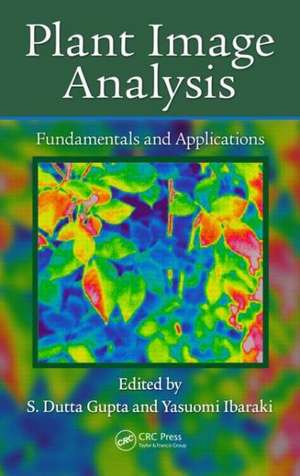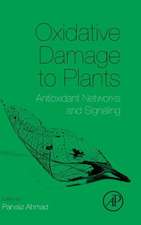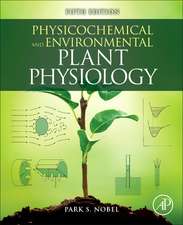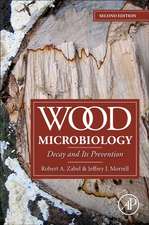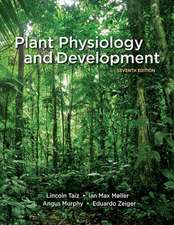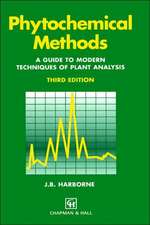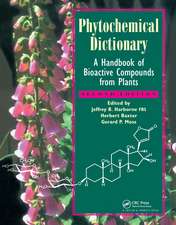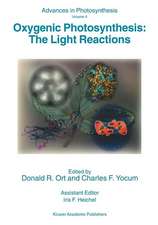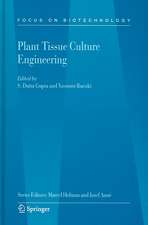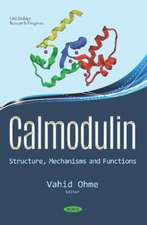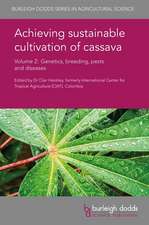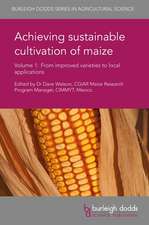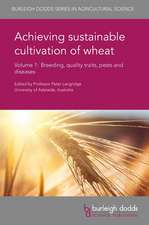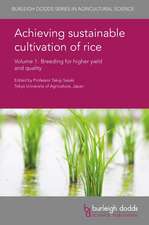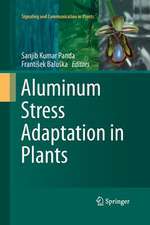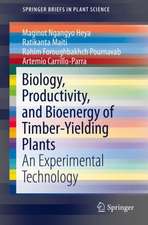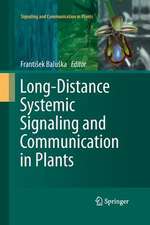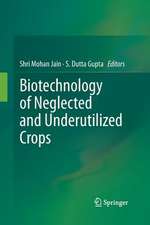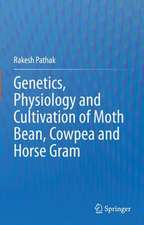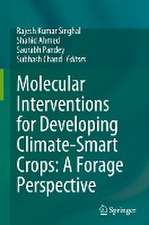Plant Image Analysis: Fundamentals and Applications
Editat de S Dutta Gupta, Yasuomi Ibarakien Limba Engleză Hardback – 17 sep 2014
Plant Image Analysis: Fundamentals and Applications introduces the basic concepts of image analysis and discusses various techniques in plant imaging, their applications, and future potential. Several types of imaging techniques are discussed including RGB, hyperspectral, thermal, PRI, chlorophyll fluorescence, ROS, and chromosome imaging. The book also covers the use of these techniques in assessing plant growth, early detection of disease and stress, fruit crop yield, plant chromosome analysis, plant phenotyping, and nutrient status both in vivo and in vitro.
The book is an authoritative guide for researchers and those teaching in the fields of stress physiology, precision agriculture, agricultural biotechnology, and cell and developmental biology. Graduate students and professionals using machine vision in plant science will also benefit from this comprehensive resource.
Preț: 1282.01 lei
Preț vechi: 1563.43 lei
-18% Nou
Puncte Express: 1923
Preț estimativ în valută:
245.33€ • 253.47$ • 204.08£
245.33€ • 253.47$ • 204.08£
Carte tipărită la comandă
Livrare economică 19 martie-02 aprilie
Preluare comenzi: 021 569.72.76
Specificații
ISBN-13: 9781466583016
ISBN-10: 1466583010
Pagini: 418
Ilustrații: 122 black & white illustrations, 49 black & white tables
Dimensiuni: 156 x 234 x 28 mm
Greutate: 0.73 kg
Ediția:1
Editura: CRC Press
Colecția CRC Press
ISBN-10: 1466583010
Pagini: 418
Ilustrații: 122 black & white illustrations, 49 black & white tables
Dimensiuni: 156 x 234 x 28 mm
Greutate: 0.73 kg
Ediția:1
Editura: CRC Press
Colecția CRC Press
Cuprins
An Introduction to Images and Image Analysis. Image Analysis for Plants: Basic Procedures and Techniques. Applications of RGB Color Imaging in Plants. RGB Imaging for the Determination of the Nitrogen Content in Plants. Sterile Dynamic Measurement of the In Vitro Nitrogen Use Efficiency of Plantlets. Noninvasive Measurement of In Vitro Growth of Plantlets by Image Analysis. Digital Imaging of Seed Germination. Thermal Imaging for Evaluation of Seedling Growth. Anatomofunctional Bimodality Imaging for Plant Phenotyping: An Insight through Depth Imaging Coupled to Thermal Imaging. Chlorophyll Fluorescence Imaging for Plant Health Monitoring. PRI Imaging and Image-Based Estimation of Light Intensity Distribution on Plant Canopy Surfaces. ROS and NOS Imaging Using Microscopical Techniques. Fluorescent ROS Probes in Imaging Leaves. Analysis of Root Growth Using Image Analysis. Advances in Imaging Methods on Plant Chromosomes. Machine Vision in Estimation of Fruit Crop Yield.
Notă biografică
S. Dutta Gupta is a professor in the Department of Agricultural and Food Engineering at the Indian Institute of Technology Kharagpur. Dr. Gupta has been engaged in teaching and research on plant tissue culture and biotechnology for more than 25 years. He is a pioneer in the application of imaging techniques in plant tissue culture system for noninvasive estimation of photosynthetic parameters. Dr. Dutta Gupta has received fellowships from various agencies and governments such as the USDA, Lockheed Martin, MHRD, INSA, CSIR, DST, Czech Academy of Sciences, and JSPS. He has published more than 100 scientific articles.
Yasuomi Ibaraki is a professor in the Faculty of Agriculture at Yamaguchi University, Japan. Dr. Ibaraki has been involved in studies on image-analysis-based evaluation of plants in micropropagation and protected cultivation for more than 20 years. He has made significant contributions in the imaging of somatic embryos, suspension cultures, and plantlets. He also has made contributions to image-based estimation of leaf area index and light intensity distribution on canopy surfaces. Dr. Ibaraki holds a Japanese patent on a method for evaluating quality of plant cell suspension culture by image analysis.
Yasuomi Ibaraki is a professor in the Faculty of Agriculture at Yamaguchi University, Japan. Dr. Ibaraki has been involved in studies on image-analysis-based evaluation of plants in micropropagation and protected cultivation for more than 20 years. He has made significant contributions in the imaging of somatic embryos, suspension cultures, and plantlets. He also has made contributions to image-based estimation of leaf area index and light intensity distribution on canopy surfaces. Dr. Ibaraki holds a Japanese patent on a method for evaluating quality of plant cell suspension culture by image analysis.
Recenzii
"Plant Image Analysis: Fundamentals and Applications is a comprehensive compilation of methods currently used for image analysis of higher plants. The book presents both fundamentals of plant imaging as well as a variety of specific techniques, hence it can be of interest to wide spectrum of plant biologists (PhD students, lecturers, biologists working in agriculture and plant biotechnology).
The book is timely: Plant image analysis is widely used nowadays and there are no such books on the market that are fully dedicated to plant image analysis. There are 16 chapters in this book, covering overall a broad spectrum of fields and techniques…. The chapters are written by experts in the fields. Most of the chapters present a good background and biological relevance.
Overall, this is an excellent book to raise awareness about plant image analysis and can be a useful addition to the library of students, teachers, and biologists interested in the methods and applications of plant imaging."
—Kamil Sklodowski, Federico Apelt, David Breuer, all of the Max Planck Institute of Molecular Plant Physiology, Potsdam, Germany and Tsanko Gechev, University of Potsdam, Institute of Biochemistry and Biology, Potsdam, Germany
"The present book is worth having for the purpose of teaching and research in Universities/Institutes dealing with emerging areas of plant and agricultural sciences. I believe it will play a pivotal role in providing the necessary impetus for entering into this fascinating field of "Plant Image Analysis" with or without any background of computer vision."
—Toyoki Kozai, Professor Emeritus of Chiba University, Chief Director, Japan Plant Factory Association, Center for Environment, Health and Field Sciences, Chiba University
"S. Dutta Gupta and Yasuomi Ibaraki outlined the broad topic they have addressed. They lead the discussion from the very basic explanation of the concept of imagery through the description of various techniques to the imagery application in plant biology, medicine and agriculture. … the authors provide an in-depth explanation of the matter thus anticipating the wide use of the described material not only by plant professionals but also as a comprehensive teaching tool for graduate and PhD. Students….
The authors made an enormous effort to put all presented information together in a well-thought and structured manner. The color inserts allow readers to get the big understanding of the overall imaging idea in plant analysis, while the specific examples and case studies support and explain in much detail the topic of each chapter, guiding the reader through the pros and cons of each described technique and make this book the valuable source of both theoretical information and practical advice from the pioneers and world-renowned experts."
--- Mykola V. Volkogon, Department of Plant Physiology and Ecology, Taras Shevchenko National University of Kyiv, Kyiv, Ukraine in PE&RS JULY 2016 Public – page 471
Overall, this is an excellent book to raise awareness about plant image analysis and can be a useful addition to the library of students, teachers, and biologists interested in the methods and applications of plant imaging."
—Kamil Sklodowski, Federico Apelt, David Breuer, all of the Max Planck Institute of Molecular Plant Physiology, Potsdam, Germany and Tsanko Gechev, University of Potsdam, Institute of Biochemistry and Biology, Potsdam, Germany
"The present book is worth having for the purpose of teaching and research in Universities/Institutes dealing with emerging areas of plant and agricultural sciences. I believe it will play a pivotal role in providing the necessary impetus for entering into this fascinating field of "Plant Image Analysis" with or without any background of computer vision."
—Toyoki Kozai, Professor Emeritus of Chiba University, Chief Director, Japan Plant Factory Association, Center for Environment, Health and Field Sciences, Chiba University
"S. Dutta Gupta and Yasuomi Ibaraki outlined the broad topic they have addressed. They lead the discussion from the very basic explanation of the concept of imagery through the description of various techniques to the imagery application in plant biology, medicine and agriculture. … the authors provide an in-depth explanation of the matter thus anticipating the wide use of the described material not only by plant professionals but also as a comprehensive teaching tool for graduate and PhD. Students….
The authors made an enormous effort to put all presented information together in a well-thought and structured manner. The color inserts allow readers to get the big understanding of the overall imaging idea in plant analysis, while the specific examples and case studies support and explain in much detail the topic of each chapter, guiding the reader through the pros and cons of each described technique and make this book the valuable source of both theoretical information and practical advice from the pioneers and world-renowned experts."
--- Mykola V. Volkogon, Department of Plant Physiology and Ecology, Taras Shevchenko National University of Kyiv, Kyiv, Ukraine in PE&RS JULY 2016 Public – page 471
Descriere
This book covers recent developments in image analysis of higher plants at leaf, plant, and small canopy level. It introduces the basic concepts of image analysis and discusses various techniques in plant imaging, applications and future potentials. It covers imaging techniques that include RGB imaging, hyperspectral imaging, thermal imaging, multi-spectral fluorescence imaging, chlorophyll fluorescence imaging and ROS imaging. It then details their use in the assessment of plant growth and photosynthetic status, early detection of diseases and stress, cellular detection of reactive oxygen species, and plant phenotyping.
